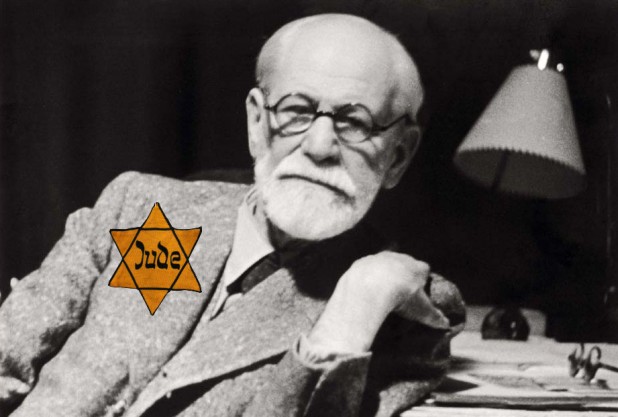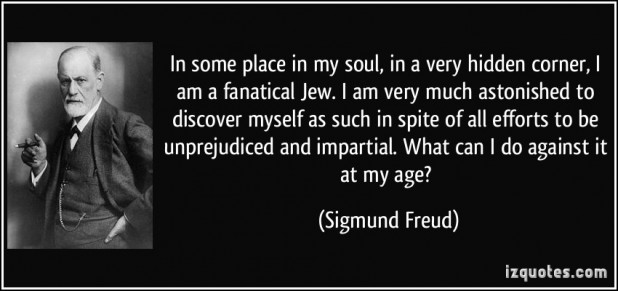Reactionary Tree
The Right Stuff
October 9, 2015

In this installment of my Culture of Critique series, I will be examining the involvement of Jewish intellectuals in the psychoanalytic movement of the early 20th century.
One of the most prominent figures in psychoanalysis, often considered the Father of the field, is Sigmund Freud. Freud is the perfect example of a Jewish social scientist with a strong Jewish identity and was motivated to combat anti-Semitism.
Jewish involvement in psychoanalysis was apparent from its inception. It was often referred to as the “Jewish science.” In 1906, all 17 members of the psychoanalysis movement at that time were Jewish. In a 1971 study, Henry, Sims and Spray found that 62.1% of their sample of American psychoanalysts identified themselves as having a Jewish cultural affinity. As you can see, the field was founded by and has been dominated by Jewish thinkers.
Now let us examine Sigmund Freud and the stir of echoes in the history of psychoanalysis.
Freud’s Jewish Identity and Disdain for the Gentile
While Freud was not religious, he had a very strong Jewish identity. In a 1931 letter, he described himself as “a fanatical Jew” and by this time became strongly sympathetic with Zionism. In a 1935 interview with Joseph Wortis, Freud revealed his feelings of Jewish superiority. Freud commented that he viewed gentiles as prone to “ruthless egoism,” whereas Jews had a superior family and intellectual life. Wortis then asked Freud if he viewed Jews as a superior people. Freud replied: “I think nowadays they are… When one thinks that 10 or 12 of the Nobel winners are Jews, and when one thinks of their other great achievements in the sciences and in the arts, one has every reason to think them superior.”
Freud conceived of himself as a leader in a war against Gentile culture. He had a great deal of hostility towards Western culture and the Catholic Church. In a remarkable passage from the Interpretation of Dreams, Freud, in attempting to understand why he has been unable to set foot in Rome, proposes that he has been retracing the footsteps of Hannibal, the Semitic leader of Carthage against Rome during the Punic wars:
“Hannibal . . . had been the favorite hero of my later school days. . . . And when in the higher classes I began to understand for the first time what it meant to belong to an alien race . . . the figure of the Semitic general rose still higher in my esteem. To my youthful mind Hannibal and Rome symbolized the conflict between the tenacity of Jewry and the organization of the Catholic Church.”
Freud viewed himself as belonging to an “alien race” at war with Rome and the Catholic Church, a central institution of Western Culture. In another one of his works Moses and Monotheism, Freud once again displays a sense of Jewish moral superiority to Christianity and his disdain for the Catholic Church:
“The Catholic Church, which so far has been the implacable enemy of all freedom of thought and has resolutely opposed any idea of this world being governed by advance towards the recognition of truth!”
This also reiterates his view that religion is nothing more than a neurotic symptomology, a view he first developed in his work Totem and Taboo. This quote also shows us that Freud viewed Western culture to be extremely repressive.
In his works Totem and Taboo and Civilization and Its Discontents he presents the view that the repression of sex, so apparent as an aspect of Western culture during Freud’s life, is the source of art, love, and even civilization itself. However, neurosis and unhappiness are the price to be paid for these traits because neurosis and unhappiness are the inevitable result of repressing sexual urges.
Freudian theory sought to cure the Gentile of his neurosis with sexual liberation. Freud viewed himself as a sexual reformer against Western cultural practices of chastity. To quote Freud, “Sexual morality—as society, in its extreme form, the American, defines it—seems to me very contemptible. I advocate an incomparably freer sexual life.”
Freudian Pseudo-Science
Now that we have established that Freud was a vengeful Jew out to subvert Western civilization with his psychoanalysis, let’s examine some of the prominent theories of Freud’s thought. The theories of the Oedipus Complex, childhood sexuality, and the sexual etiology of neuroses (the id) are junk and play no role in contemporary mainstream psychology. They are merely attempts by Freud to subvert Gentile culture.
The Oedipus complex amounts the notion that we all secretly want to kill our fathers so we can fuck our mothers. From an evolutionary psychological standpoint, this is total nonsense. First, such a relationship between a mother and son would result in genetically inferior offspring from inbreeding. Second, killing off the father would deny the child paternal support from resource provisioning and protection.
Freud also developed a theory of childhood sexuality. Freud often conflated love and pleasure with sexual desire. Pleasures derived from oral gratification via breast feeding or love were actually manifestations of sexual pleasures according to Freud. Of course, there is no data to support that these affectional ties that children have with their parents are redirected forms of sexual desire. These affectional ties are developmentally important for children. They help form higher levels of social cohesiveness which are necessary to provide a high level of support for children.
The id is a part of Freudian theory about personality structures. The id contains our basic instinctual drives. It is the source of our bodily needs, desires, and impulses. Here we see Freud’s political agenda of cultural critique at play. Our sexual urges have a deep biological basis (the id) while traits such as responsibility, orderliness, dependability, and delaying gratification are all imposed upon us by a repressive, pathology-inducing society and culture. This is also silly because no animal or human has devoted their entire life entirely to self-gratification. There is no evidence to suggest that our biology would be solely directed at obtaining immediate gratification and pleasure. In the real world, achieving various goals requires some degree of future time-preference, long-term planning, and deferral of gratification.
 Freudian Psychoanalysis as a Weapon against Gentile Culture
Freudian Psychoanalysis as a Weapon against Gentile Culture
It is apparent that Freud’s intention was to undermine Gentile norms regarding sex and marriage. Western marriage has long been egalitarian, monogamous, and exogamous, which is in contrast to more Eastern societies, which are more stratified (alphas on top with harems and betas on the bottom with no women). The supposed repression of sexual behavior has served to support socially imposed monogamous relationships. These relationships result in high-investment parenting, and thus more competitive offspring.
An important effect of Western institutions of sex and marriage was to facilitate high-investment parenting. High-investment parenting generally results in more competitive offspring. As already indicated, perhaps the most basic mistake Freud made was the systematic conflation of sex and love. This was also his most subversive mistake, and one cannot overemphasize the absolutely disastrous consequences of accepting the Freudian view that sexual liberation would have salutary effects on society.
The psychoanalytic emphasis on legitimizing “free” sexuality and premarital sex is therefore fundamentally a program that promotes low-investment parenting styles. Low-investment parenting is associated with precocious sexuality, early reproduction, lack of impulse control, and unstable pair bonds. Applied to Gentile culture, the subversive program of psychoanalysis would have the expected effect of resulting in less competitive children; in the long term, Gentile culture would be increasingly characterized by low-investment parenting, and there is evidence that the sexual revolution inaugurated, or at least greatly facilitated, by psychoanalysis has indeed had this effect.
Since Ashkenazi Jews have a higher IQ on average than Europeans, they are less reliant on these cultural supports than Gentiles are. In the great Darwinian struggle between Jews and Gentiles, less competitive Gentile offspring would result in Jewish success in resource competition. So far, it has been working with great success.
Freud’s work would also go on to be extremely influential in the Frankfurt School (which will be talked about more in a later essay). Both Freud and the Frankfurt School viewed Western culture as highly repressive and in need of cultural critique.
As you can see, Freudian psychoanalysis has been destructive to Western civilization, particularly with its role in the facilitation of the sexual revolution of the 1960s. While Freudian theory has been mostly abandoned, we are still feeling the effects of it.
Sources
MacDonald, Kevin. 1998. Jewish Involvement in the Psychoanalytic Movement.
MacDonald, Kevin. 1998. Culture of Critique.
Also published on Fanghorn Forest

